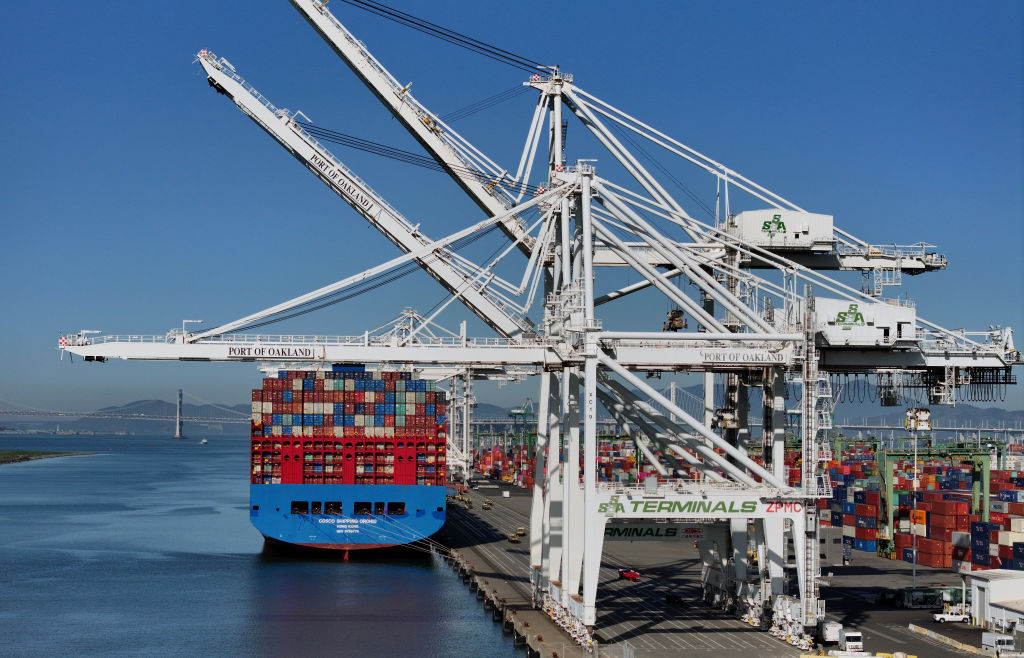A U.S. congressional investigation raises concerns about Chinese-made cranes in U.S. ports. AFP/GETTY IMAGES
THE WATCH STAFF
Two United States congressional panels have concluded that cranes used in U.S. ports and manufactured by companies linked to the People’s Republic of China’s (PRC) government pose significant national security risks. The yearlong probe by the House Homeland Security Committee and the Select Committee on the Chinese Communist Party concluded that the Chinese company ZPMC pressured port operators to allow the company to maintain remote access, potentially allowing the PRC to malignly influence the operation of critical domestic infrastructure. “Some ports insist on securing their assets, but many cave to the pressure,” the September 12, 2024, report stated, according to The Wall Street Journal newspaper. The PRC pressure makes it “difficult for customers who are looking to get the lowest price or guarantee a robust warranty policy,” the report stated.
Of particular concern to investigators was the unauthorized presence of modems on many of the cranes. The modems, which could be used to monitor and repair the cranes, can also transmit sensitive security information to the PRC, which has laws that require companies to share intelligence with state security agencies, according to the Journal. The modems, the report stated, “created an obscure method to collect information, and bypass firewalls in a manner that could potentially disrupt port operations.”
Potential PRC influence in U.S ports has been a persistent concern for policymakers. In a 2023 investigation, the Journal found evidence of potential espionage capabilities in ZPMC cranes in several ports. That revelation, fueled by intelligence findings, prompted U.S. President Joe Biden to invest more than $20 billion to replace foreign-built cranes with U.S.-manufactured ones and slapped 25% tariffs on Chinese shipping cranes. ZPMC cranes account for about 80% of ship-to-shore cranes in use at U.S. ports, according to the Journal. The American Association of Port Authorities has said there have been no known security breaches due to the presence of Chinese cranes at U.S. ports. The Coast Guard and federal law enforcement also monitor port security.
In an April 2024 letter to the committee staff, ZPMC denied responsibility for installing the cellular modems found on its cranes. “The exact identity of those responsible for installing the modems, while likely ZPMC, remains unclear,” the report said. PRC officials have denied any involvement and accuse the U.S. of using national security to unfairly harm Chinese businesses.
However, ZPMC is a subsidiary of China Communications Construction, a leading contractor for PRC General Secretary Xi Jinping’s Belt and Road initiative to develop infrastructure and trade links across Asia and Africa, the Journal reported. Third-party vendors complicate the issue, the report found. Software from a Swiss firm and other vendors outside the PRC have allowed “critical internal components” to be installed in China and remain in the country for up to 18 months, the report found.
“The U.S. maritime sector is dangerously reliant on equipment and technology that has been produced, manufactured, assembled, or installed in the PRC, including ship-to-shore cranes, container handling equipment, and various other critical maritime infrastructure components. This is due in large part to noncompetitive pricing that favors PRC (linked firms) technological disparities, and the lack of domestic manufacturer alternatives. Contracts between PRC (linked firms) and U.S. ports do not adequately prioritize security in favor of the latter, and often lack provisions prohibiting unauthorized modifications or access to equipment by the former. The PRC’s geopolitical ambitions, particularly regarding Taiwan, raise additional concerns about the security of U.S. maritime supply chains, as the PRC could potentially leverage its dominance to exert pressure on the United States,” the 50-page report’s executive summary states.

